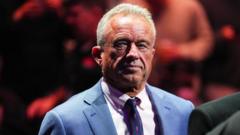Robert F. Kennedy Jr. has pledged to reform America's diet by targeting ultra-processed foods and harmful additives, sparking both support and skepticism. As a potential head of Health and Human Services, he faces significant challenges in challenging Big Food and enacting major dietary changes.
Can RFK Jr. Revolutionize America’s Dietary Landscape?

Can RFK Jr. Revolutionize America’s Dietary Landscape?
RFK Jr. aims to combat ultra-processed foods and reform food regulations if confirmed as head of HHS under President Trump.
Robert F. Kennedy Jr. is determined to reshape how Americans consume food and beverages, tackling issues that range from artificial dyes found in popular cereals to unhealthy oils used in fast food. As the anticipated head of the Department of Health and Human Services (HHS) under President-elect Donald Trump, Kennedy is well-known for his outspoken criticisms of ingredients he believes adversely affect public health.
At a recent rally, he stressed the significance of protecting children from what he claims to be toxic substances in food, declaring, "We are betraying our children by letting [food] industries poison them." However, in order to push forward with his agenda of reducing junk food consumption, Kennedy will need to navigate through a complex web of existing food regulations and challenge the interests of major food corporations.
Former NYU nutrition professor Marion Nestle remarks, “What he's suggesting is taking on the food industry... will Trump back him up on that? I’ll believe it when I see it.” While Kennedy's past has raised eyebrows, with accusations of promoting unsubstantiated health claims, his campaign to reform the FDA has garnered some support. Colorado’s Democratic Governor Jared Polis even tweeted praises for Kennedy’s intentions, although he later clarified that “science must remain THE cornerstone of our nation’s health policy.”
As Kennedy seeks to enact his "Make America Healthy Again" initiative, he emphasizes the need to eliminate ultra-processed foods—those laden with added sugars, fats, and preservatives—which are linked to a variety of health issues. He specifically highlighted the impact of unhealthy school lunch programs, stating, “We have a generation of kids who are swimming around in a toxic soup right now.”
Should Kennedy be confirmed, his responsibilities will include overseeing the US Food and Drug Administration (FDA), a vast agency tasked with ensuring food safety among many other roles. Recent criticism of the FDA has pointed to issues of transparency and efficacy, creating an opening for Kennedy to tighten regulations. He has voiced intentions to clear out what he calls a "corrupt system" within the agency, suggesting that departments not executing their tasks effectively should be dismissed.
Kennedy has also made headlines for controversial stances, including his beliefs about the dangers of fluoride in drinking water and his support for unpasteurized milk which science has shown could pose serious health risks. His campaign against seed oils, claiming they are harmful to health, has sparked further debates over nutritional science.
Public health experts have applauded some of Kennedy's motivations, particularly his push against ultra-processed foods and harmful additives. However, they warn that many of his proposals lack scientific backing and may even be detrimental. Critics argue there’s insufficient evidence to support the idea that seed oils are a primary driver of obesity.
Political climate may hinder Kennedy’s ambitious plans. FDA authority and food policy in the US are tightly regulated, requiring intricate collaboration with the USDA and Congress, complicating any sweeping changes he may propose. Many in the food industry have already mobilized to express their concerns regarding Kennedy’s proposed reforms.
Looking ahead, some experts suggest Kennedy could work within existing regulatory frameworks to promote healthier diets, particularly through revising the US Dietary Guidelines which influence school lunches and military meals. Past updates to these guidelines have yet to label ultra-processed foods as detrimental to health.
The complexity of reforming America’s food environment indicates that while Kennedy has a compelling vision for public health, translating that vision into actionable policy may encounter substantial hurdles—both politicized and bureaucratic.






















